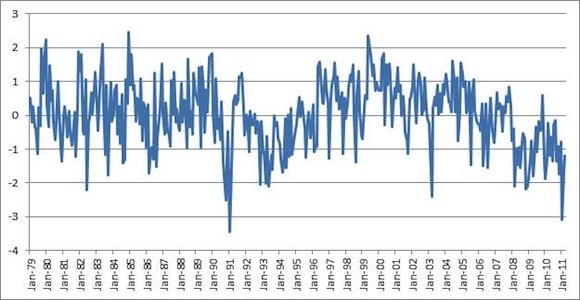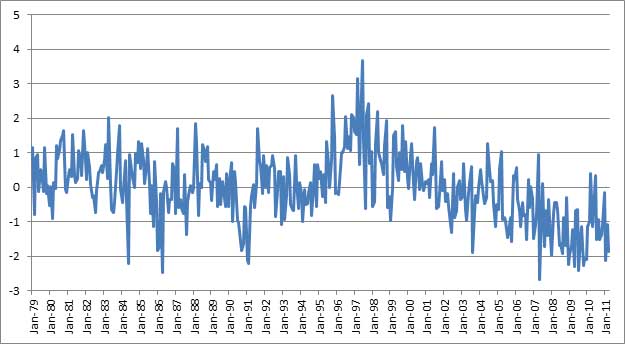Predicting revolutions by analyzing open sources
The developers of the University of Illinois have created software that is supposedly able to predict the places of the new “orange revolutions” by retrospectively analyzing the “tone” of informational messages in the media over the past thirty years. The authors declare that their program successfully predicted the start of revolutions in Egypt and Libya. Moreover, long before its destruction of Osama bin Laden, the program established North Pakistan as its most likely location.
The program analyzes informational messages from almost all countries of the world. The main sources are the global Open Source Center databases (funded by the US government for foreign intelligence) and the similar British base BBC Monitoring , as well as the New York Times archive. In total, all these sources contain more than 100 million news articles, as a result of which mapping amounted to about 100 trillion links. Information processing is carried out on the SGI Altix supercomputer with a capacity of 8.2 TFLOPS.
Two basic methods are used to analyze the tone of messages. The first (sentiment mining) calculates the overall emotional assessment of the document, taking into account the emotional tint of each word. For example, the words “good”, “good” have a high positive emotional tinge, and the words “terrible” or “terrible” have a strong negative one. If the tone of messages drops sharply, then this may indicate an increase in tension in the region. The second technique (full-text geocoding) allows you to bind the emotional evaluation of messages to geographic coordinates.

The graph shows an analysis of the tone of informational messages about Egypt - before the revolution, it had decreased to this level only twice in the last 30 years.
')
For example, widespread protests in Egypt began on January 25, 2011, which led to the overthrow of President Mubarak on February 11. Monitoring the tone of messages in the media included 52,438 articles from January 1979 to March 2011, which mentioned the name of at least one Egyptian city. The filter by the word "Egypt" was not used to weed out articles that only occasionally mention this country. So, by January 24, 2011, the tone of messages dropped to a level that had only been observed twice in the previous 30 years. Once, in January 1991, when US aircraft bombed the Iraqi army in Kuwait, and the second time, in March 2003, during the American invasion of Iraq.
Thus, the program even before the start of mass unrest could have made an assumption about the high probability of overthrowing Mubarak, although even notable Egyptologists at that time were not ready to admit such a possibility.
Similar predictions were made in Tunisia (6636 articles) and Libya (14109 articles), although they do not appear so clearly due to the small number of articles - in Tunisia in some months there were no more than 10 news items in the database.


via Singularity Hub
The program analyzes informational messages from almost all countries of the world. The main sources are the global Open Source Center databases (funded by the US government for foreign intelligence) and the similar British base BBC Monitoring , as well as the New York Times archive. In total, all these sources contain more than 100 million news articles, as a result of which mapping amounted to about 100 trillion links. Information processing is carried out on the SGI Altix supercomputer with a capacity of 8.2 TFLOPS.
Two basic methods are used to analyze the tone of messages. The first (sentiment mining) calculates the overall emotional assessment of the document, taking into account the emotional tint of each word. For example, the words “good”, “good” have a high positive emotional tinge, and the words “terrible” or “terrible” have a strong negative one. If the tone of messages drops sharply, then this may indicate an increase in tension in the region. The second technique (full-text geocoding) allows you to bind the emotional evaluation of messages to geographic coordinates.

The graph shows an analysis of the tone of informational messages about Egypt - before the revolution, it had decreased to this level only twice in the last 30 years.
')
For example, widespread protests in Egypt began on January 25, 2011, which led to the overthrow of President Mubarak on February 11. Monitoring the tone of messages in the media included 52,438 articles from January 1979 to March 2011, which mentioned the name of at least one Egyptian city. The filter by the word "Egypt" was not used to weed out articles that only occasionally mention this country. So, by January 24, 2011, the tone of messages dropped to a level that had only been observed twice in the previous 30 years. Once, in January 1991, when US aircraft bombed the Iraqi army in Kuwait, and the second time, in March 2003, during the American invasion of Iraq.
Thus, the program even before the start of mass unrest could have made an assumption about the high probability of overthrowing Mubarak, although even notable Egyptologists at that time were not ready to admit such a possibility.
Similar predictions were made in Tunisia (6636 articles) and Libya (14109 articles), although they do not appear so clearly due to the small number of articles - in Tunisia in some months there were no more than 10 news items in the database.


via Singularity Hub
Source: https://habr.com/ru/post/129162/
All Articles